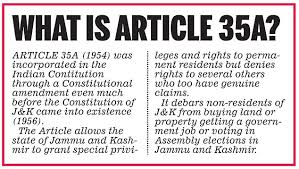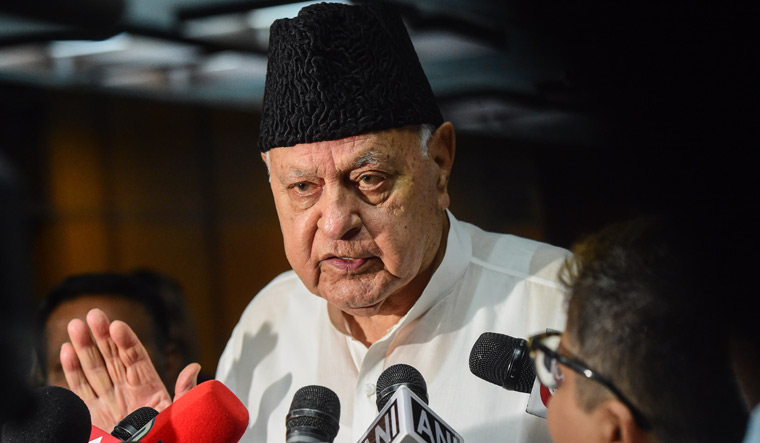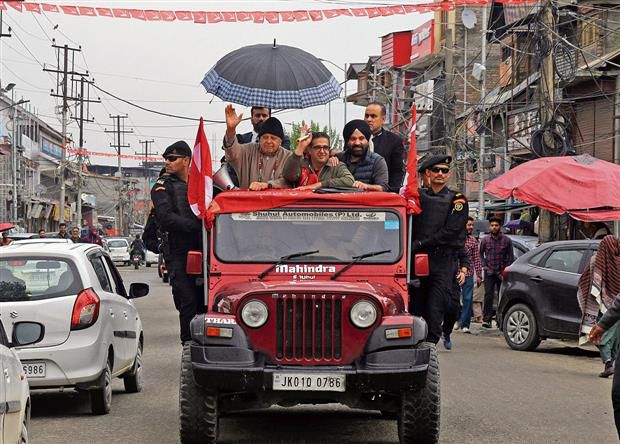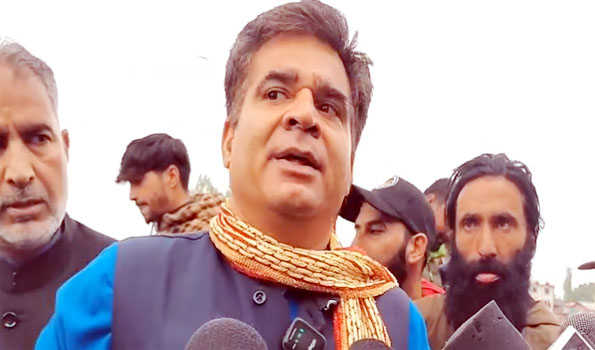Repealing Article 35A will end J&K’s relationship with rest of the country: Shah Faesal
Outspoken IAS officer Shah Faesal today said repealing of Article 35A of the Constitution would end Jammu and Kashmir’s relationship with the rest of the country.
Faesal, a 2010-batch IAS exam topper, is currently pursuing a mid-career masters programme in the US.
“I would compare Article 35A to a marriage-deed/nikahnama. You repeal it and the relationship is over. Nothing will remain to be discussed afterwards,” he said in a tweet.
He said the accession of Jammu and Kashmir to India took place before the Constitution had come into force.
“Yes and those who say Accession still stands forget that Accession was just like a Roka, because the Constitution had not come into force that time.
Can Roka still bind two people together even after the marriage document is annulled?” he wrote.
The IAS officer, however, said continuing the special Constitutional provisions in respect to Jammu and Kashmir did not pose any threat to the sovereignty and integrity of the country.
“Let’s not confuse the issue. Sovereignty and integrity of India can’t be challenged. Not at all. But the Constitution has kept some special provisions for J&K state. It’s a unique arrangement. It isn’t a threat to India’s integrity at all,” he said.
Faesal is already subject to a disciplinary proceeding initiated by the Jammu and Kashmir government at the request of the Centre’s Department of Personnel and Training for posting a tweet about frequent rapes in the country.
Article 35A is an Article of faith: Prof Gul Wani
Prof Wani: Art 35A is a sensitive issue. It is for the people of Jammu and Kashmir and not for the people of India. It is not in Indian constitution. It is part of Delhi agreement .It is part of a compact. It is a saving clause. It empowers the J&K legislature to define permanent residents. It protects state subject law. No law can be inconsistent with state subject law. Our law is protected .No outsider can take employment, scholarship here and the same is restricted to state subjects only. The fact is that constitution of J&K also protects state subjects. Art 35A is a standalone Article . It is not in Indian constitution. Pursuant to the provisions of Art 370(1)(d) the president of India by an order notified the provisions of Art 35A.
QUESTION: THE SUPREME COURT IS HEARING THE MATTER ON AUGUST 6. TELL US ABOUT THE PRESENT POSITION.
Prof Wani: There are five petitions before the Supreme Court including the lead petition. Section 6 of J&K constitution has also been challenged. One petition is challenging Art 35 A. Another the continuance of Art 370.Charu Wali Khanna -a Kashmiri Pandit woman married to a Punjabi filed a PIL on the ground that Art 35 is discriminatory towards women. Certain fundamental rights of Indian constitution viz Art 15 (prohibition against discrimination on basis of religion,caste,race or place of birth), Art 14 (equality),Art 16 (Equality of opportunity in matters of public employment and reservations) have been employed in the servicing of these petitions. Fundamental rights dealing with Art 19, 21 and 25 too are pressed into service. In 2014 the Supreme court entertained three parties viz the Government of India, the state government and “We the Citizens” which in public perception is a sponsored NGO. The matter before the Supreme Court is Art 35A be deleted and declared invalid. The Jammu and Kashmir government through its counsel filed a short affidavit on the advice of senior counsel Fali Nariman who had advised the state that we can ask the Supreme Court to dismiss the petition on basis of its earlier decisions. However, a longer affidavit can be filed in case the need arises. The union government did not file the affidavit which could have given us an idea about the state of mind of present union government. Fali Nariman earlier had described Afzal Guru case one of absolute thoughtlessness and recklessness.
QUESTION: HOW ARE DIFFERENT STAKEHOLDERS GOING TO CONTEST THE PETITIONS IN SUPREME COURT?
Prof Wani: I think the grounds are very strong. State subject law is very much protected in the state constitution as well. There are parties invoking international and bilateral dimension of Kashmir problem. That the instrument of accession is limited and state has negotiated its constitutional relationship with Indian union without executing the instrument of merger. That Article 35 A and Article 370 are matters of faith.
Article 35A a sensitive matter for people of J&K: Raabitah-e-Madaaris-e-Islaamiyyah Arabiyyah (RMIA)
Raabitah-e-Madaaris-e-Islaamiyyah Arabiyyah (RMIA), Jammu & Kashmir on Sunday said that attempts to scrap Article 35A have caused great anxiety among the residents of Jammu and Kashmir.
In a statement issued here, RMIA, “a non-political board of Islamic education”, said that as Article 35A grants special status to Jammu and Kashmir, so the public concern is quite “natural”.
“This is a sensitive matter for the people of Jammu and Kashmir as this article safeguards the special status of J&K, and scrapping it would set a dangerous precedent,” the statement said.
The board said: “In response to every such step which will challenge Article 35A or which will jeopardize the special status of J&K, exercising the responsibility to defend it while maintaining unity at every level is necessary for the residents of J&K.”
It said the Raabitah-e-Madaaris-Islaamiyyah Arabiyyah convened a conference on 4 August 2018, in which the district representatives from Poonch, Rajouri, Udhampur, Riyasi, Samba, Kathua, Jammu, Doda, Kishtwar, Ramban besides the Kashmir valley were present.
The conference, it said, passed a resolution expressing great concern over “challenging of the Article 35A” in the court of law. The conference, it said, urged the permanent residents of J&K, organizations, forums, political & non-political institutes “to take care of this volatile situation and do not become heedless.”
The RMIA urged the authorities to refrain from “taking such measures which will hurt the sentiments of the people of J&K” as otherwise, according to it, the people of J&K “will remain worried about their future.”
The conference was attended by the president RMIA, Maulana Muhammad Rahmatullaah Sahib Qaasmi (Daamat-Barakatuhum), Maulana Mufti Nazeer Ahmad Sahib Qaasmi (General Secretary), Maulana Sayyid Muhammad Iqbaal Sahib Qaasmi (vice-president for Kashmir province), Maulana Sa’eed Ahmad Habeeb Sahib (vice-president for Jammu province), Maulana Inayatullaah Sahib Qaasmi (undersecretary for Jammu province). Besides, the entire executive council members and more than four hundred representatives across Jammu and Kashmir were present.
RMIA is a board of Islamic education which is apolitical in nature, it said.
The board comprises of Deeni-Madaaris (institutes imparting religious education to the Muslim children) situated in Jammu and Kashmir. The heads and the persons concerned with these institutes are the permanent residents of Jammu & Kashmir, the statement said.
Cong defends Art 35-A, ‘GoI of playing politics over it’
Ahead of the crucial hearing on the petitions challenging the validity of Article 35-A in the Supreme Court on Monday, the main opposition Congress Sunday slammed the rightwing BJP-led government at New Delhi accusing it of playing politics on the issue of the special status to Jammu Kashmir.
The party also defended Article 35-A saying it had a historical context which grants special status to the State and accused the Modi government of “deliberately delaying” the publication NRC of Assam which left out a 4 million people from the citizenship list.
Addressing media person here, Congress spokesperson Pawan Khera alleged that the Modi government had attempted to stall NRC.
He said on November 30, 2017, the Supreme Court came down heavily on the Modi government for its excuses to delay the NRC in Assam as the Attorney General of India gave the excuse of fear of violence.
On Congress party’s stand on Article 35-A as the apex court is hearing a batch of petitions challenging it on Monday, Khera defended it saying, “There has been a historical context to Article 35-A.”
He said the party sees it in the larger picture of Article 370 whose joint architects were the then government comprising Syama Prasad Mookerjee and other stalwarts.
“They had wide consultations and then from then on Article 370 has also evolved to where it is now,” Khera said.
He said the special status of Jammu Kashmir had been shrank to one or two points as jurisdiction of the Supreme Court , Election Commission and other constitutional bodies had been extended to the State.
“There is the Election Commission jurisdiction over Jammu Kashmir, there is the Supreme Court’s jurisdiction over Jammu Kashmir, there is the Postal department’s jurisdiction, and there are hardly one or two points, which still remain,” he said. “Let this government have a wider consultation.”
Khera alleged that the government and ruling BJP had been playing politics.
“Let this government stop playing politics on it. Atal (Bihari Vajpayee) onwards, they have been playing politics through their manifesto. What are they doing in that direction? What are the consultations they are having? Who are the stake holders with which they will have these consultations? Let them come out and clarify,” he said.






